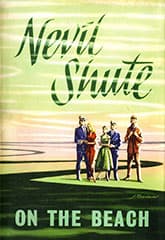On the Beach
Critique • Quotes • At the movies
 First edition
First editionFirst publication
1957
Literature form
Novel
Genres
Literary, post-apocalyptic
Writing language
English
Author's country
England
Length
Approx. 94,500 words
A whimper in the sand
It's interesting and odd that On the Beach and On the Road came out the same year. Both are dated 1957, but how very different they are. Only the accident of their titles being sequential in an alphabetical list could make one think of them together. Yet each is, in its own way, representative of their shared era.
Jack Kerouac's On the Road may be the cry of the generation growing up in the shadow of potentially apocalyptic events, turning away from that terror to find energizing life in personal catharsis, in living for the moment, in a hedonistic iconoclasm. As its title suggests, it's going somewhere, and for decades afterwards Kerouac's novel has been a guide of sorts for counterculture rebels.
Nevil Shute's On the Beach though is the older generation realizing what it has wrought, shocked to find itself at a dead end, huddled on the beach as in T.S. Eliot's poem, "The Hollow Men", from which the novel gets its title, awaiting the final bang or whimper. You can run no further after you reach the ocean's edge. This is Nevil Shute watching the sun set on the dreams of his age.
Despite all that's been written about On the Beach being a warning against a disastrous future, with it being mentioned in the same breath as George Orwell's Nineteen Eighty-Four, this is a book consumed with looking back. Amid the understated horrors is a continual, quiet reflection, a re-evaluation of the past as the end approaches. Even nostalgic at times.
Nearly everyone in the world has been killed by an atomic war and the radiation cloud is heading toward the hold-outs in Australia. But a warmth envelopes Shute's decent characters as they await their inevitable ends, recounting idyllic childhoods, reliving their great romances, and endeavouring to die by the standards by which they have always lived. It's almost as if nuclear holocaust brings out the best in people.
Shute's weakness as a writer turns out to be a strength in this single novel. In other hands the story could have been a shrill tale of terror—it is discussing, after all, the end of our world with everyone facing a horrible death. But Shute's writing is as discreet as ever, his main characters are restrained to the point of pathology, carrying on with their jobs, seldom if ever expressing the fears and bewilderment they must be experiencing
Surreal atmosphere
When characters, such as the flirtatious Moira or the comfort-seeking Mary, do finally fly off the handle, they soon afterwards come to their senses and apologize to the calm, efficient men in their lives—namely, the stranded American submarine commander Dwight Towers and the Australian Navy man Peter Holmes.
Knowing full well what is in store, nearly everyone goes about daily life as always, right up to the last day on earth. It may sound ludicrous when described like this, but in the novel it creates a surreal atmosphere—not because it's strange but because it isn't. Shute's usual upright folks, plopped into the middle of Armageddon, are suddenly poignant figures.
When it was published, On the Beach was heralded not only as a prophetic caution but also as a beautifully written and profoundly moving piece of art. Today the simplistic quality of Shute's writing, with every turn signalled far in advance and every significant point underlined, may detract from readers' appreciation. This is so especially when compared with other acclaimed writers of the 1950s whose works continue to be avidly read: Kerouac, J.D. Salinger, Vladimir Nabokov, Saul Bellow, William S. Burroughs and others. Again, it seems incredible they were writing at the same time as Shute.
But nonetheless On the Beach made a connection with the broad public of its time that few writings of other, greater authors ever did. And it undoubtedly had a deeper effect on the world affairs of its era than did other more enduring novels.
We may still value On the Beach in that context—as the greatest product of a middling writer who was blessed with storytelling abilities. And who, like his characters, succeeded in the end by dint of hard, honest work.
— Eric
Critique • Quotes • At the movies

